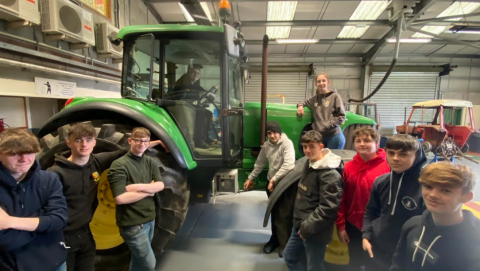Glynllifon Agricultural College Project Introduction: Hydrogen Electrolyser
Site: Glynllifon Agricultural College, Clynnog Rd, Penygroes, Caernarfon
Technical Officer: Rhys Davies
Project Title: Hydrogen Electrolyser
Project Outline:
One challenge facing farmers in terms of reducing the amount of carbon dioxide (CO2) created is the use of diesel and machinery in various farm processes. New technology to reduce particulates and greenhouse gases is common on newer tractors; however, on older models, such technology is not available. On certain farm tasks, it tends to be older tractors that are used; as they generally are not used to carry out tasks on roads, they are replaced less often. One solution on older machinery is to retrofit a hydrogen electrolyser, which is a relatively cheap option to reduce emissions and diesel use.
The premise of the electrolyser is to split water into its component parts of oxygen and hydrogen (HHO) by passing an electrical current through distilled water with a potassium hydroxide electrolyte, and collecting the gases. By introducing the hydrogen rich ‘oxyhydrogen’ mix into the engine, at a rate of approximately 6 per cent, a faster burn and more efficient combustion process takes place, thus reducing the amount of fuel used and consequently lowering the emissions produced.
The electrolyser manufacturer suggests that a reduction of 20-25 per cent in fuel usage can be achieved, and a reduction in emissions by 80 per cent. The 1,000 hours the telehandler is in operation each year sees a fuel saving of 1,083 litres, with an equivalent of 43,440kg of CO2 not being released as a result. The manufacturer adds that in many modern engines, up to 30 per cent of fuel introduced into the engine is not used, and instead is burnt in the exhaust system. By increasing the amount of oxygen and hydrogen into the air mix, the burn in each stroke is quicker, without increasing the engine temperature. The system is only in use while the engine is running, and draws six to eight amps from the battery.
Aim of the project:
To investigate the effectiveness of the hydrogen electrolyser on existing out-of-warranty tractors at Coleg Glynllifon.
To provide an opportunity for young agricultural engineering students and the wider industry to learn more about the potential for low-carbon technology on agricultural machinery.
What will be done:
Data on fuel use and emissions will be collected over a period of time prior to fitting, and then again after being fitted. The routine task the tractor undertakes will be kept the same (i.e. mixing, feeding or field work etc).
Where possible, readings will be taken at local HGV MOT testing centres.
What information will be recorded:
Tractor CO2 reading prior and post-kit fitting
Tractor Diesel usage for a month preceding kit fitting and usage for a month post-kit fitting.

